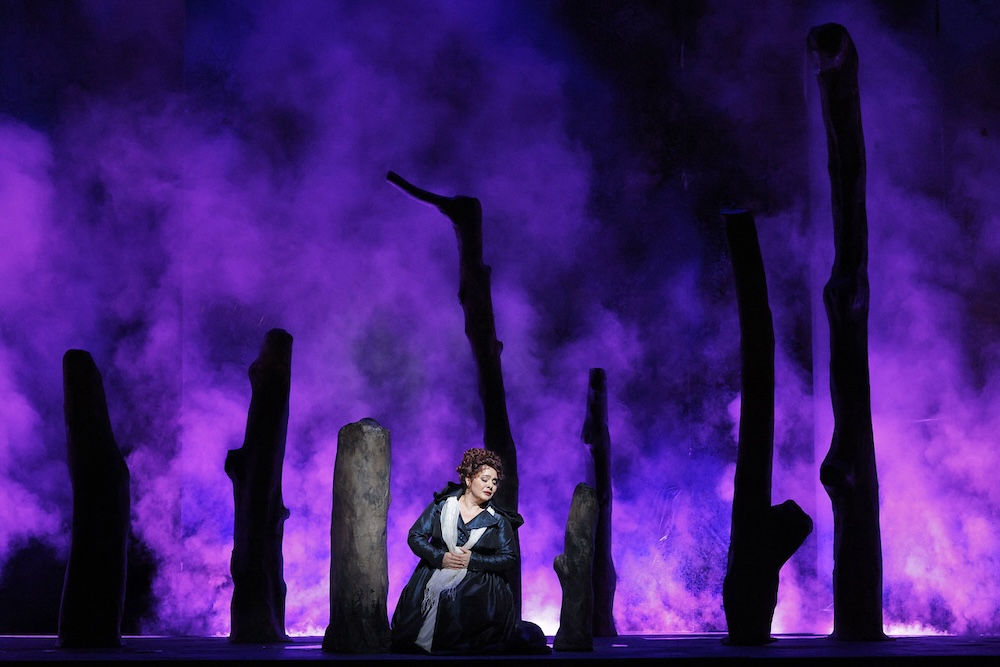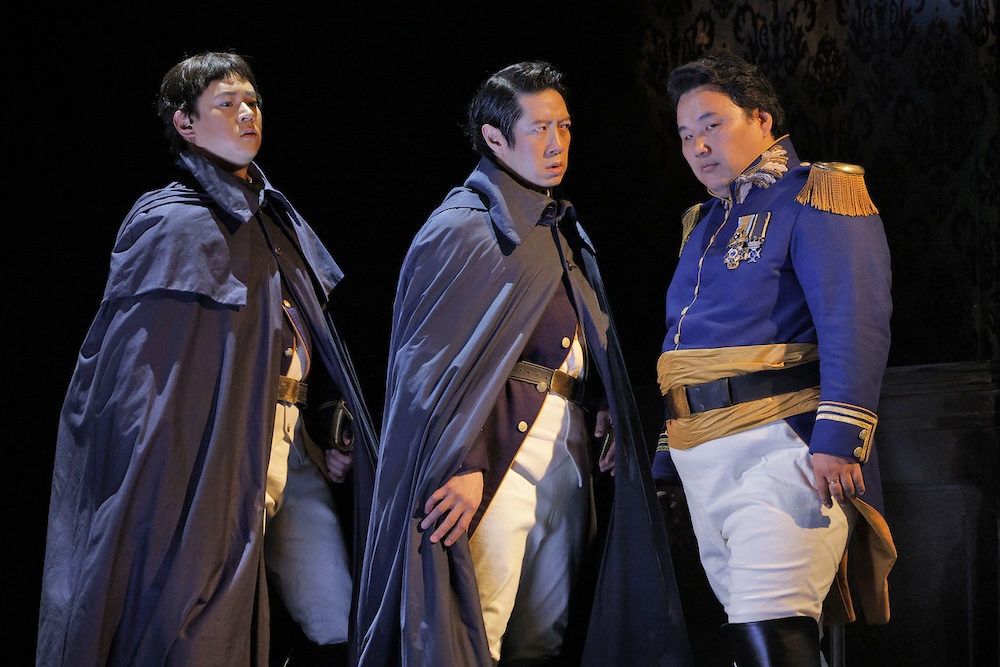Where were the censors who once plagued Verdi’s Ballo just now when they should have saved us from an abysmal staging at San Francisco Opera!
It was the 2016 production from the Teatro di Roma directed by someone named Leo Muscato. In addition to writing and staging many plays over the last 20 or so years Mr. Muscato has found time to stage many operas, in many Italian cities, large and small.
At least it was not another rehash of San Francisco Opera’s old 1977 production (last seen in 2013) designed by John Conklin and restaged by many different directors over the years.
Verdi’s original Ballo was titled Gustavo III. But censors objected to putting a monarch (of any era) on the stage, much less murdering him. So the opera became Una vendetta in domino set in provincial Poland. Finally it became Un ballo in maschera, though it was now set in colonial Boston. Regicide was obviously a hot topic at the time, what is now Italy dealing with the Hapsburgs, the Bourbons, the House of Savoy and the Pontiff, not to mention that everyone knows what happened to the Capetians.
The premiere of Ballo was in Rome in 1859 — as the Boston Ballo! (this version was once actually seen here in San Francisco!). Nowadays Ballo is usually set in Stockholm. Interestingly, the Swedish crown was once an important player in European politics, both in pre-revolutionary France during Ballo’s king Gustavo III’s reign, and in the checkerboard of early-unification Italy under the House of Savoy (1861).
Whatever political edge Verdi’s late middle period operas (Ballo, Forza, Boccanegra) may have had, or still have is ignored by stage director Leo Muscato. Verdi’s Ballo libretto, made by Antonio Somma (the librettist as well for Verdi’s Re Lear) is based on French playwright Eugène Scribe’s original 1833 Le Bal Masqué libretto (for composer Daniel Auber) that made this bit of history (the assassination of Gustavo) into a classic melodrama — Amelia, an invented character, as a fallen woman.

It was murky storytelling, more suggestive than apparent, particularly in the Act II setting (a field outside town where Amelia is to pick a magical herb), where Gustavo and Amelia would declare their love. It was but a light show of rainbow colors on raging vapors, nothing more, hardly magical.
Verdi created very beautiful music for Un ballo in maschera, much of it derivative of his famed early middle period operas, but also looking forward to his Don Carlos with its extensive use of the minor second (Renato’s weeping). San Francisco Opera Music Director Eun Sun Kim held the San Francisco Opera Orchestra in very firm control, encouraging always the quite beautiful voices on stage to pour out their troubled words, carefully unleashing her orchestra from time to time to underscore Verdi’s grandiose, operatic passions.
Conductor Kim’s second act was musically exquisite, carefully building to the climactic declaration of love — but the declaration itself disappeared into the random colors of the light show. Adding to the subversive staging suffered by the conductor was the melodramatic lighting — sudden intensities, momentary darkness, etc. The imported, Italian, Muscato production rendered Eun Sun Kim’s beautifully conducted Ballo slick rather than felt.
The role of Gustavo (aka Ricardo) as sung by tenor Michael Fabiano (lead photo, with Ulrica) was a tour de force, this excellent singer held full voice through three punishing acts, offering finally an exquisitely phrased death scene. Though Mr. Fabiano has a quite beautiful voice, it does not possess the Italianate character that would have more fully created his musical character. Mr. Fabiano was perhaps directed to vividly act out his role. It read, however, as stock, over-acting.
Amelia was sung by Armenian soprano Lianna Haroutounian. She too possesses a quite beautiful voice, she rendered her Amelia in exquisite phrasing, and acted in reserved, operatic stances that were indeed appealing. Though her voice is more adapted to the Puccini heroines she often plays, her Amelia was convincingly achieved.

Gustavo’s friend Renato was sung by Mongolian baritone Amartuvshin Enkhbat. Mr. Enkhbat is a true Verdi baritone of beautiful voice. He too found synchronicity with conductor Kim to deliver an excellent, quite singerly performance though his Italianate stage presence seemed a bit out of place on the War Memorial stage — his career is exclusively in Italian theaters.
Oscar was sung by Chinese soprano Mei Gui Zhang in a quite charming performance of a role that is usually a star turn. The cameo role of Ulrica was sung by famed Romanian mezzo Judit Kutasi (lead photo, with Gustavo). She was in excellent voice, holding the stage appropriately as a true Verdi mezzo.
The supporting players were well cast. With the exception of Adam Lau as Count Ribbing, Jongwon Han as Count Horn, Samuel Kidd as Silvano, and Thomas Kinch as Amelia’s servant are all current Adler Fellows.
This splendid cast deserved a real production.
Michael Milenski
War Memorial Opera House, San Francisco, CA., September 24, 2024.
All photos copyright Cory Weaver, courtesy of San Francisco Opera